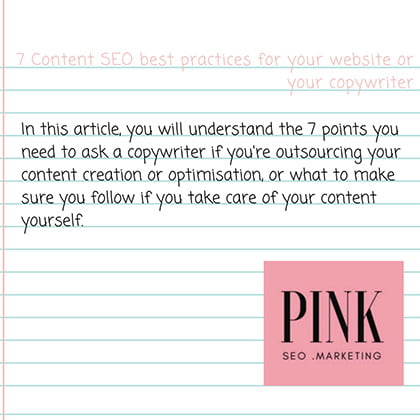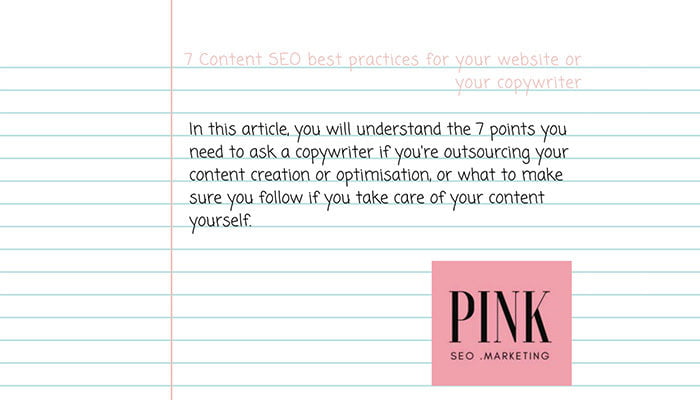7 Content SEO best practices for your website or your copywriter
- Home
- Articles and Publications
- SEO Tips
- 7 Content SEO best practices for your website or your copywriter
7 Content SEO best practices for your website or your copywriter
Posted on July 10, 2018
0 Comment
Recently, I provided a client of mine with some guidelines for the most important content SEO best practices to pass on to his copywriter, and I will share them with you all today in this article. You can also use these tips if you’re writing your own content.
The importance of writing content
Writing blog posts is important for Google. It shows that our website keeps providing fresh information. Our customers appreciate it, too, if this content is useful. Remember, with RankBrain, Google can detect if our customers appreciate our content by looking at the time they spend on the page, the number of pages they check, etc.
We’re web users ourselves. And we know how we tend to appreciate finding lovely content regularly on a website we love. Your website visitors will do the same. How often you write is entirely up to you. You might write an article every week, send a newsletter on the same day of the week (which is a great way to create habits), or share content less often. However you decide to do it, get your prospective customers in the habit of finding something from you regularly. They will end up expecting it and waiting for your content to arrive. Wouldn’t that be sweet?
Always struggling with time? Outsource your content writing
Unfortunately, most of the business owners I know struggle to find time to write their own content. They often don’t like writing very much. Maybe it’s because we used to feel judged about it at school! The business owners I know often tell me that focusing on their own skills and strengths is a much better use of their time. This is something I can truly understand, but in these cases, I always encourage them not to neglect this vital part of their website SEO. Writing content is one of the sides of the Search Engine Optimisation triangle, which is made up by:
- Content.
- Code.
- Backlinks.
My SEO strategy checklist when my clients are working with copywriters
Many copywriters I know are already familiar with the Yoast SEO plugin for WordPress, so what I do with them is:
- to research,
- strategically choose,
- and provide them with the (focused, related and long-tail) keywords for each post and page.
- I explain and make sure that they follow the most important content SEO best practices, which I will explain below,
- and I double check the content
- before starting to track the position of the targeted page for the selected keywords or key phrases.
What you would need a copywriter to do is to (re)write content pieces following basically these 7 Content SEO best practices.
- Use a focused keyword in key points, like title, subheaders, URL, meta description, images alt text, and content. (For more details, check these SEO content writing guidelines)
- Use a number of related, long-tail keywords you would suggest in the content (check “What are long-tail keywords and why do they convert more?“)
- Make sure the copy has a length that’s never shorter than 600 words, aiming for 1k (if you work with an SEO Specialist, the exact suggested content length would be specified post by post, comparing your page with the ones currently ranking in the top 10 positions on Google).
- Include a call-to-action that you would specify.
- Add internal links to the other posts and pages which naturally and logically link to each piece of content.
- Include external links to reliable, non-competitive sources.
- Embed videos wherever possible, from reliable, non-competitive sources.
Their talent would be to make sure these key points sum up in such a well-written piece that your bounce rate for that page would be lower than 30%.
This is the kind of results you should expect the target performance for your needs from any copywriter who would be happy to assist you.
Check the FREE video training version of this article here:



